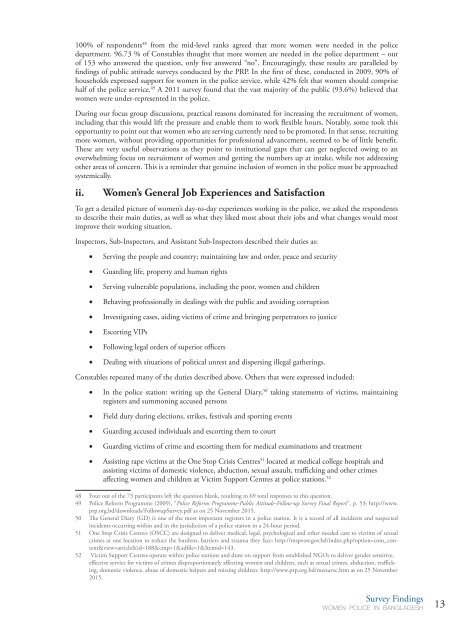ROUGH ROADS TO EQUALITY
22SDTw
22SDTw
Create successful ePaper yourself
Turn your PDF publications into a flip-book with our unique Google optimized e-Paper software.
100% of respondents 48 from the mid-level ranks agreed that more women were needed in the police<br />
department. 96.73 % of Constables thought that more women are needed in the police department – out<br />
of 153 who answered the question, only five answered “no”. Encouragingly, these results are paralleled by<br />
findings of public attitude surveys conducted by the PRP. In the first of these, conducted in 2009, 90% of<br />
households expressed support for women in the police service, while 42% felt that women should comprise<br />
half of the police service. 49 A 2011 survey found that the vast majority of the public (93.6%) believed that<br />
women were under-represented in the police.<br />
During our focus group discussions, practical reasons dominated for increasing the recruitment of women,<br />
including that this would lift the pressure and enable them to work flexible hours. Notably, some took this<br />
opportunity to point out that women who are serving currently need to be promoted. In that sense, recruiting<br />
more women, without providing opportunities for professional advancement, seemed to be of little benefit.<br />
These are very useful observations as they point to institutional gaps that can get neglected owing to an<br />
overwhelming focus on recruitment of women and getting the numbers up at intake, while not addressing<br />
other areas of concern. This is a reminder that genuine inclusion of women in the police must be approached<br />
systemically.<br />
ii.<br />
Women’s General Job Experiences and Satisfaction<br />
To get a detailed picture of women’s day-to-day experiences working in the police, we asked the respondents<br />
to describe their main duties, as well as what they liked most about their jobs and what changes would most<br />
improve their working situation.<br />
Inspectors, Sub-Inspectors, and Assistant Sub-Inspectors described their duties as:<br />
• Serving the people and country; maintaining law and order, peace and security<br />
• Guarding life, property and human rights<br />
• Serving vulnerable populations, including the poor, women and children<br />
• Behaving professionally in dealings with the public and avoiding corruption<br />
• Investigating cases, aiding victims of crime and bringing perpetrators to justice<br />
• Escorting VIPs<br />
• Following legal orders of superior officers<br />
• Dealing with situations of political unrest and dispersing illegal gatherings.<br />
Constables repeated many of the duties described above. Others that were expressed included:<br />
• In the police station: writing up the General Diary, 50 taking statements of victims, maintaining<br />
registers and summoning accused persons<br />
• Field duty during elections, strikes, festivals and sporting events<br />
• Guarding accused individuals and escorting them to court<br />
• Guarding victims of crime and escorting them for medical examinations and treatment<br />
• Assisting rape victims at the One Stop Crisis Centres 51 located at medical college hospitals and<br />
assisting victims of domestic violence, abduction, sexual assault, trafficking and other crimes<br />
affecting women and children at Victim Support Centres at police stations. 52<br />
48 Four out of the 73 participants left the question blank, resulting in 69 total responses to this question.<br />
49 Police Reform Programme (2009), “Police Reforms Programme-Public Attitude-Follow-up Survey Final Report”, p. 53: http://www.<br />
prp.org.bd/downloads/FollowupSurvey.pdf as on 25 November 2015.<br />
50 The General Diary (GD) is one of the most important registers in a police station. It is a record of all incidents and suspected<br />
incidents occurring within and in the jurisdiction of a police station in a 24-hour period.<br />
51 One Stop Crisis Centres (OSCC) are designed to deliver medical, legal, psychological and other needed care to victims of sexual<br />
crimes at one location to reduce the burdens, barriers and trauma they face: http://mspvaw.gov.bd/index.php?option=com_content&view=article&id=188&cmp=1&adfile=1&Itemid=143.<br />
52 Victim Support Centres operate within police stations and draw on support from established NGOs to deliver gender sensitive,<br />
effective service for victims of crimes disproportionately affecting women and children, such as sexual crimes, abduction, trafficking,<br />
domestic violence, abuse of domestic helpers and missing children: http://www.prp.org.bd/menuvsc.htm as on 25 November<br />
2015.<br />
Survey Findings<br />
WOMEN POLICE IN BANGLADESH<br />
13<br />
Rough Road to Equality_Bangladesh Police_7-12-15.indd 19<br />
1/8/2016 5:00:38 PM


